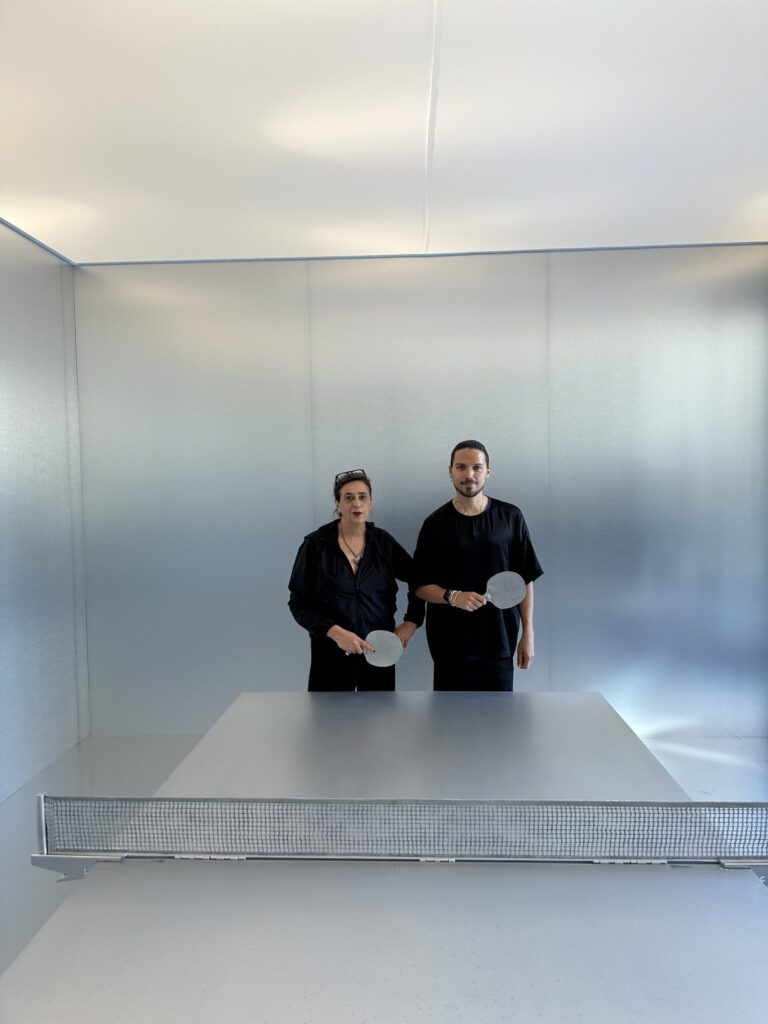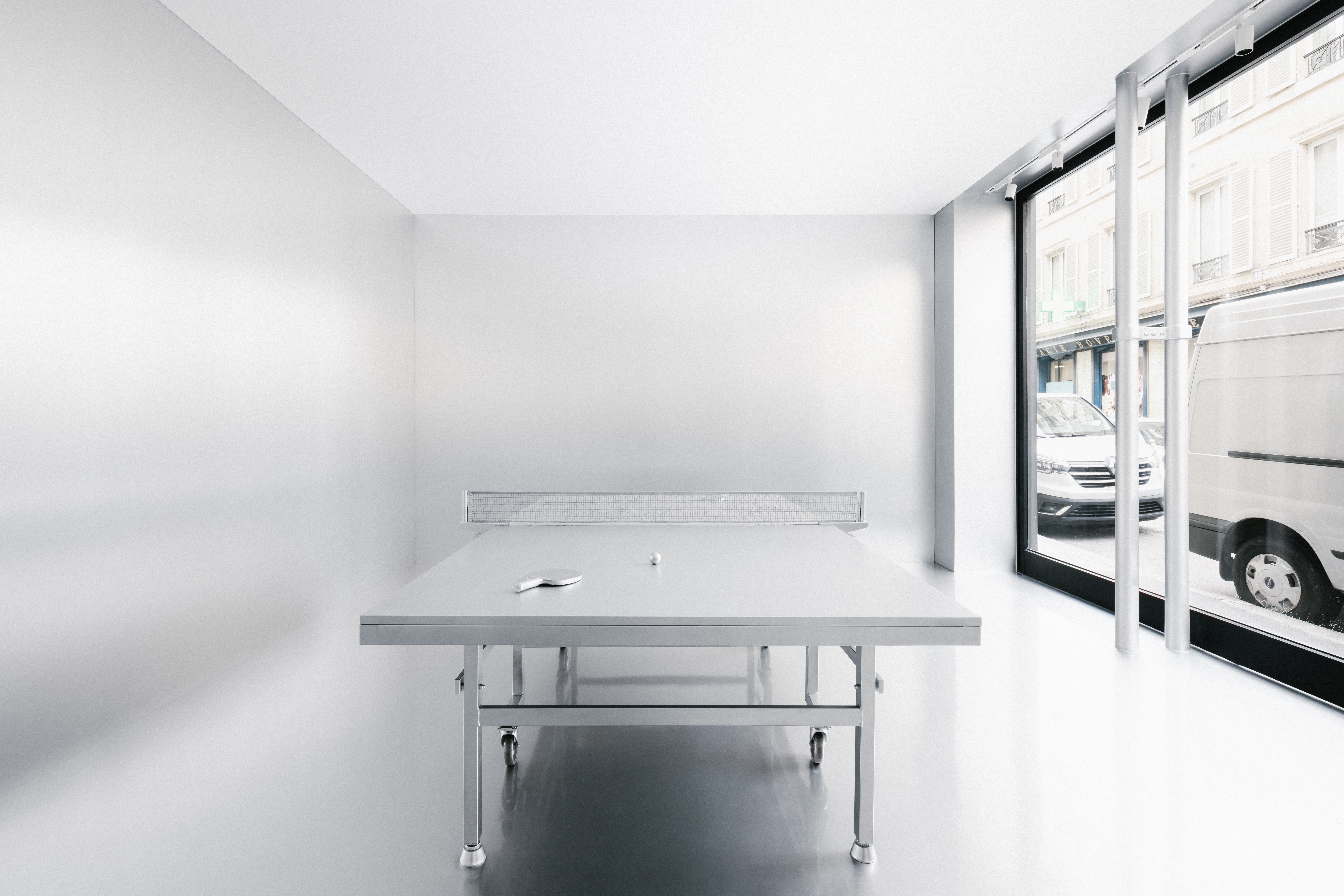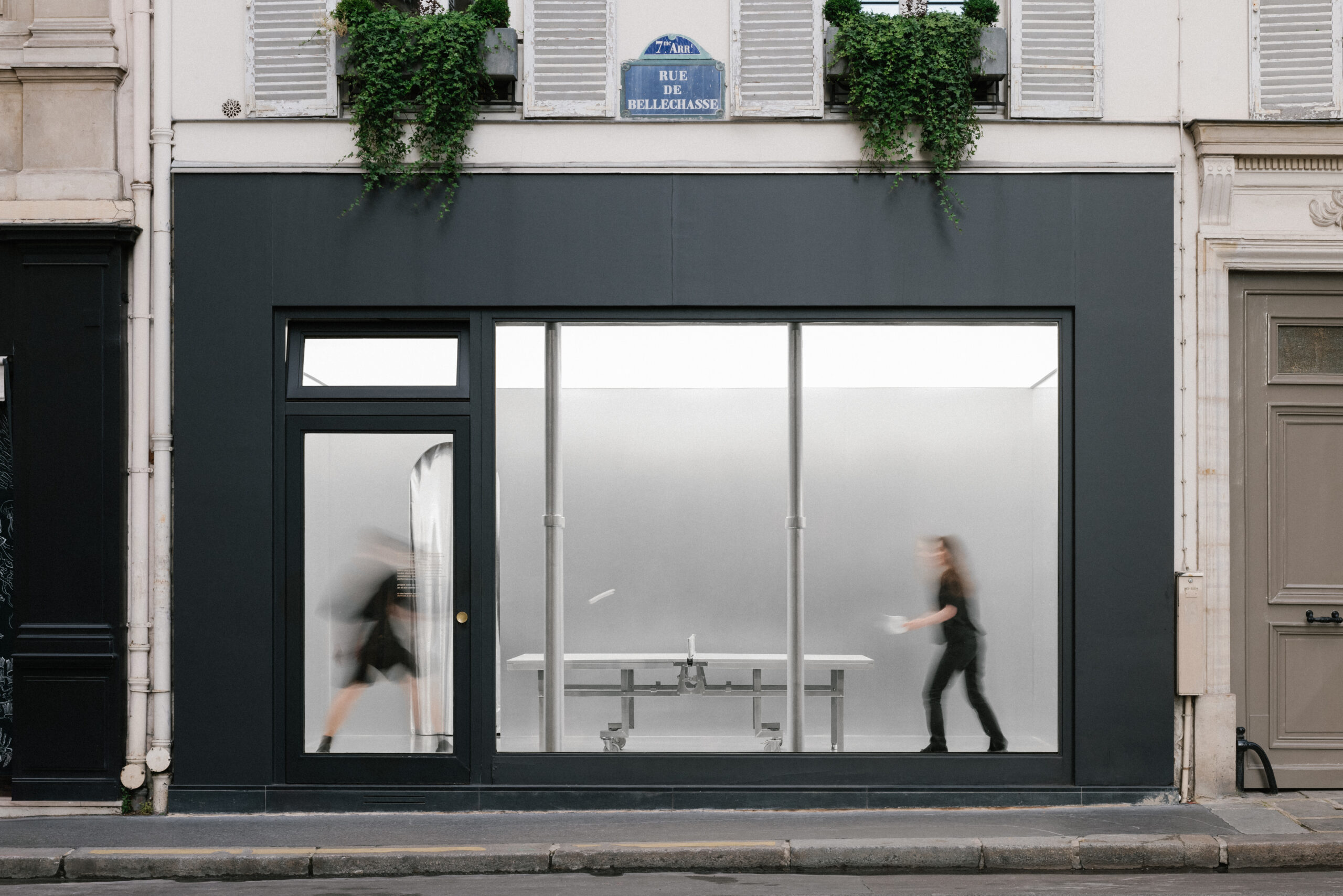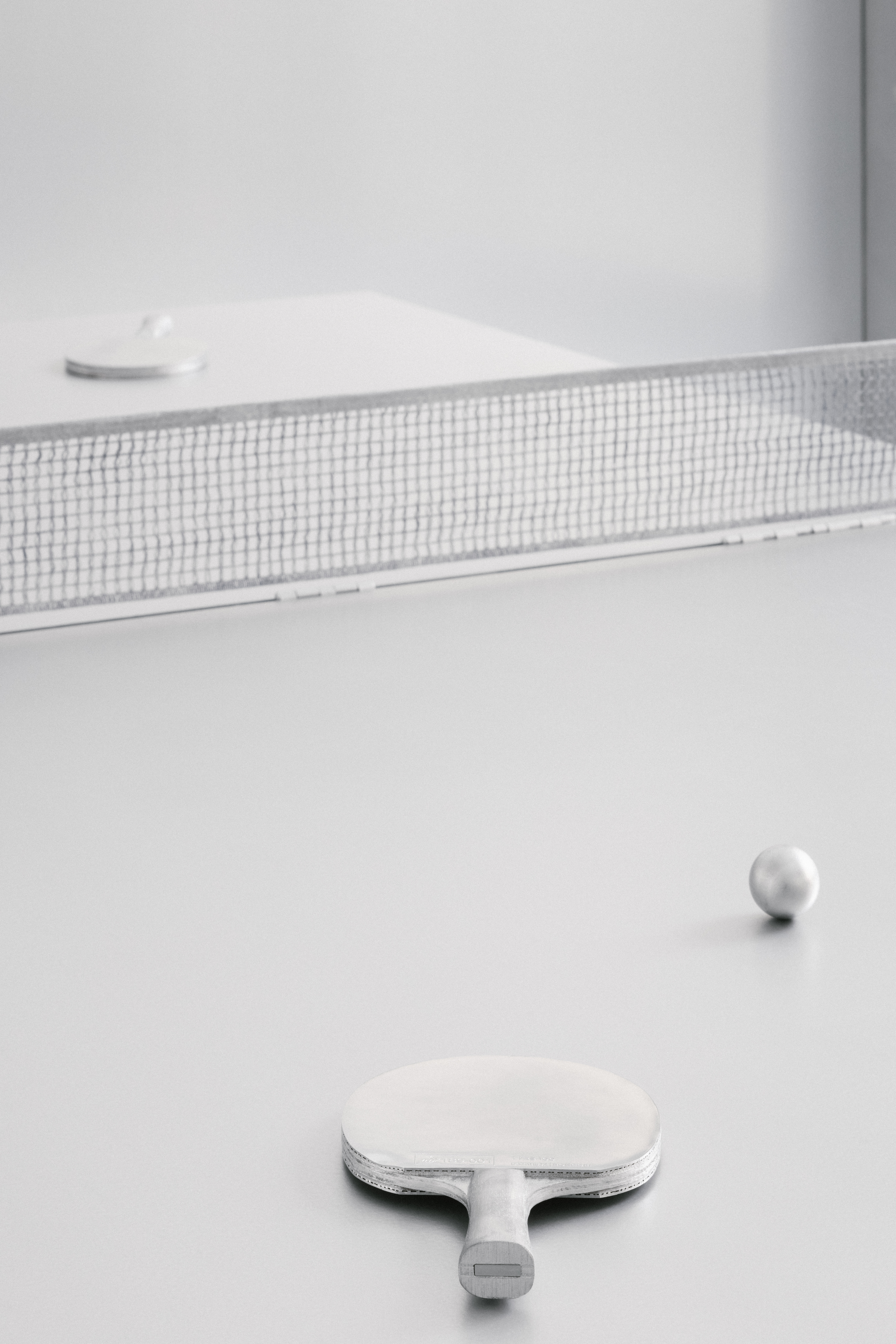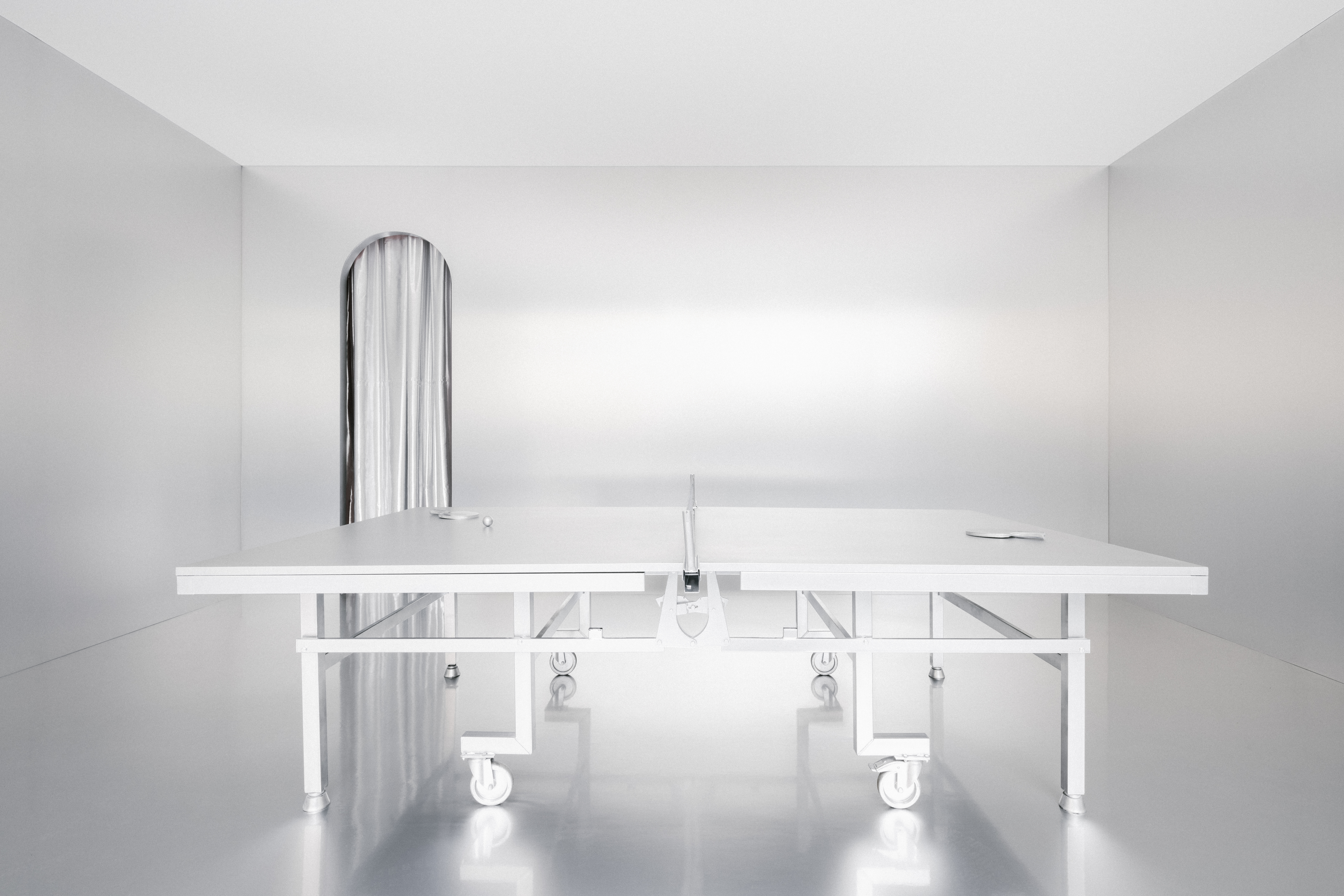Last month, French-Iranian architect India Mahdavi, known for her expressive sculptural furniture designs, invited the founder and creative director of Crosby Studios, Harry Nuriev, to transform her Paris gallery into ping-pong room covered entirely in a reflective silver coating. A nod to the Paris Olympics, which will be kicking off later this month, Match Point will be open to the public from Monday through Saturday, until August 2nd. Mahdavi explains that the installation got it’s name from the 2005 Scarlett Johansson-Jonathan Rhys Meyers tennis rom-com, just after Nuriev explains what he took away from this Summer’s cheeky hit, Challengers: “It’s interesting how this game is really about relationships,” he said. “Two people really have to love each other, even if they compete against each other.” Shortly after the exhibition opened, and just as the city anticipates a swath of visitors for the Olympic season, the two got on the phone to talk about the fusion of sport and design and the nature of collaboration.
———
INDIA MAHDAVI: Hi, Harry.
HARRY NURIEV: Hi! I’m in Paris. I’m at the gym.
MAHDAVI: You’re in the gym?
NURIEV: Yeah. And I see you’re in the office.
MAHDAVI: I’m in the office.
NURIEV: India, first of all, I’ve admired your work for many years. Obviously, I knew of you way before we met. We have such a small community, and there’s not many people in the business. So once two creatives get together to bring something to the party, I think it’s always great. And I love the idea of your Project Room, so we kind of got along very well from the very beginning.
MAHDAVI: The way I see your work, Harry, you describe yourself as a transformist. Your space and your own apartment changes all the time. And it seems like you also transform elements from your everyday life into other pieces, and use the objects of the daily life as objects to transform. And actually, the way I see the Project Room is really all about that. It is about having a temporality of transformation and actually giving a rhythm to not only the studio, but also to the people, this community, and inviting designers, architects, or curators to come and take over this room so it can become dynamic and change all the time. I like these movements and I think that’s very present in your work. Do you agree with that?
NURIEV: Yeah, I do. Your project room is a pure platform for transformation, because it’s transforming every season. And also, your incredible signature objects and your language, and my language in my world, they align together in a parallel reality. We all speak in the same language. We’re all talking about the same thing.
MAHDAVI: Our connection was really very quick. I’d seen many of your installations and I also know that you worked on the idea of sports. I had seen the previous installation and I really wanted to connect. One of the things that I like about the Project Room is to be able to connect it with the city. I wanted to make it lively and active during the season of the Olympics and sort of create our own season of the Olympic Games. And when I asked you, “Would you respond to doing a ping pong room?” It was immediate. It triggered your imagination right away. It was sort of like playing ping pong with you already.
NURIEV: Yeah, it’s like we missed the sequence of building a relationship. We just jumped on the project right away. Our industry is really the territory of sport. You and I, we’re both athletes in our industry—we train every day, six or eight hour days, sometimes 14 hours. I just watched this movie, actually. What was it? Challengers, we went to a premiere. It’s interesting how this game is really about relationships. Two people really have to love each other, even if they compete against each other. I mean, we don’t have to compete in this project, but it’s all about playing and engaging with one another.
MAHDAVI: The best way to bring life together is to actually play with each other. And actually, the name Match Point was a bit of a reference to Woody Allen’s movie, which I really love. At the end of the movie, you can win or you can lose. But there’s one point when the ball hits the net and the ball can either go on one side or the other. And suddenly, there’s this resonance with what’s happening right now in French political life, where you really feel like there’s a match going on.
NURIEV: I think one of the features of this project is how reactive and fast we make this thing happen. And in our Match Point, in our ping pong game, we didn’t disagree once in anything, which I really like. And it’s proven that we’re all about the same target, all about the same light at the end of the tunnel, we just have different ways of getting there. Are you excited for the opening tomorrow?
MAHDAVI: I’m very excited.
NURIEV: Are you feeling nervous?
MAHDAVI: No, I’m not nervous at all. I’m very excited. You can see it even more when you’re in the space, how it’s a physical digital match in a way, because you’re floating. Because the floor, the walls, the ceiling, it all kind of disappears in a way and suddenly, you’re suspended in space and in time a bit. And when you see the images, it’s very airy, but it’s physical. It really looks like the first image you sent me. It’s quite amazing.
NURIEV: Let’s talk about the fact that it’s going on during the Olympics. I don’t know how much we can talk about it, or if we even have legal rights to say Olympics—
MAHDAVI: I think we are allowed to say Olympic season. [Laughs] It’s supposed to be activated during all of the Olympics. But what it really is is for people to come every afternoon and take over the room and play. It would be great for me to see people playing all afternoon, to see people enjoying the room. For me, that would be really great.
NURIEV: And I think we’re expecting over 500 people tomorrow. At least that’s what I heard.
MAHDAVI: Oh, really?
NURIEV: And maybe more, eventually.
MAHDAVI: Oh my god.
NURIEV: It’ll be fun. And we’re going to have some electrolyte water to drink.
MAHDAVI: Yes, we’ll have sports drinks and energy bars. We’ve also invited some professional players to encourage people to play. That will be fun.
NURIEV: Are we going to play together?
MAHDAVI: Yeah, I think so. Are you a good player?
NURIEV: I’m not. I think you have to teach me.
MAHDAVI: I’m not such a good player either. But we could try, that’s for sure. Is this the first time you’ve done a sports room like this? I know you’ve done sports gear. I’ve seen them in blue, I think, covered in textile, right?
NURIEV: Yeah, I was playing with my day-to-day. One of my projects was a gym room that I fully covered with denim. It was fun. It was still functional, actually. And now, I’m working on my new project, which is also going to be gym at my studio.
MAHDAVI: Harry, how often do you change the furniture in your studio?
NURIEV: Maybe two or three times a year. How often do you change the Project Room?
MAHDAVI: Four or five times a year. I try to change the project room according to what’s happening in the city. So, we’re doing something for the Olympics. You’re part of this group of creatives that link fashion and design. From what I see of your work, there’s no borders between those two disciplines. Of course, we’ll have something in September [for Fashion Week]. So we kind of have this rhythm that’s very nice, things always changing. We keep on inviting people and bringing a community together. I think you came by to see the exhibition Flowers, which was linked with the fair’s Matter and Shape. I never plan them so much in advance. I say, “Okay, let’s see what we can do next.” It remains very spontaneous, which I really love. It doesn’t run like a gallery. It has more of this sort of fun, cultural meaning rather than anything really commercial. I’m at a stage in my life where I like to share, I like to converse, I like to collaborate. I don’t have to show my work all the time. It’s more about trying to put together a community of people who are doing interesting things.
NURIEV: That’s what I really admire in your work. And thank you so much, again, for letting me express my vision.
MAHDAVI: Thank you, Harry. See you tomorrow.

